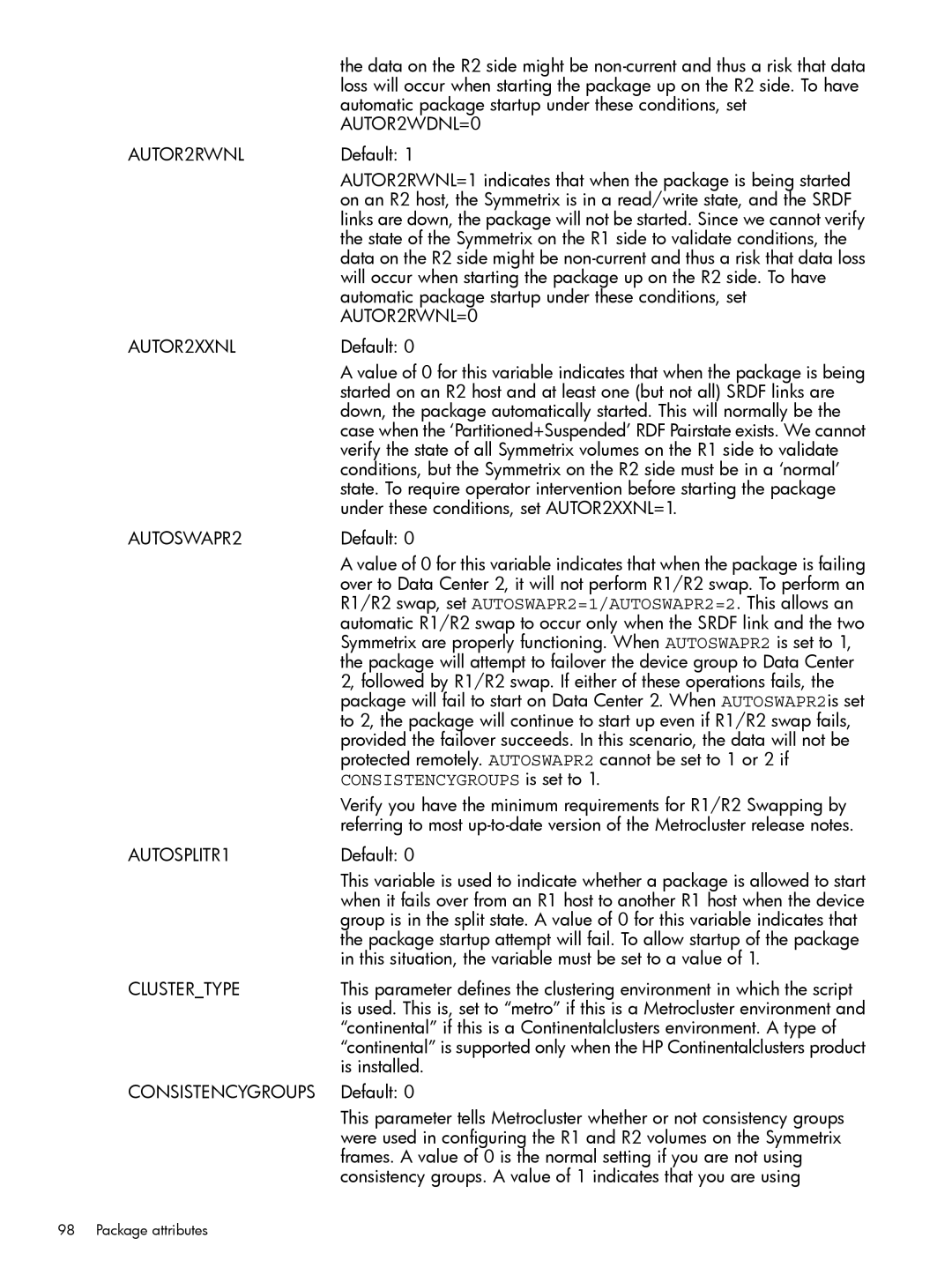| the data on the R2 side might be |
| loss will occur when starting the package up on the R2 side. To have |
| automatic package startup under these conditions, set |
| AUTOR2WDNL=0 |
AUTOR2RWNL | Default: 1 |
| AUTOR2RWNL=1 indicates that when the package is being started |
| on an R2 host, the Symmetrix is in a read/write state, and the SRDF |
| links are down, the package will not be started. Since we cannot verify |
| the state of the Symmetrix on the R1 side to validate conditions, the |
| data on the R2 side might be |
| will occur when starting the package up on the R2 side. To have |
| automatic package startup under these conditions, set |
| AUTOR2RWNL=0 |
AUTOR2XXNL | Default: 0 |
| A value of 0 for this variable indicates that when the package is being |
| started on an R2 host and at least one (but not all) SRDF links are |
| down, the package automatically started. This will normally be the |
| case when the ‘Partitioned+Suspended’ RDF Pairstate exists. We cannot |
| verify the state of all Symmetrix volumes on the R1 side to validate |
| conditions, but the Symmetrix on the R2 side must be in a ‘normal’ |
| state. To require operator intervention before starting the package |
| under these conditions, set AUTOR2XXNL=1. |
AUTOSWAPR2 | Default: 0 |
| A value of 0 for this variable indicates that when the package is failing |
| over to Data Center 2, it will not perform R1/R2 swap. To perform an |
| R1/R2 swap, set AUTOSWAPR2=1/AUTOSWAPR2=2. This allows an |
| automatic R1/R2 swap to occur only when the SRDF link and the two |
| Symmetrix are properly functioning. When AUTOSWAPR2 is set to 1, |
| the package will attempt to failover the device group to Data Center |
| 2, followed by R1/R2 swap. If either of these operations fails, the |
| package will fail to start on Data Center 2. When AUTOSWAPR2is set |
| to 2, the package will continue to start up even if R1/R2 swap fails, |
| provided the failover succeeds. In this scenario, the data will not be |
| protected remotely. AUTOSWAPR2 cannot be set to 1 or 2 if |
| CONSISTENCYGROUPS is set to 1. |
| Verify you have the minimum requirements for R1/R2 Swapping by |
| referring to most |
AUTOSPLITR1 | Default: 0 |
| This variable is used to indicate whether a package is allowed to start |
| when it fails over from an R1 host to another R1 host when the device |
| group is in the split state. A value of 0 for this variable indicates that |
| the package startup attempt will fail. To allow startup of the package |
| in this situation, the variable must be set to a value of 1. |
CLUSTER_TYPE | This parameter defines the clustering environment in which the script |
| is used. This is, set to “metro” if this is a Metrocluster environment and |
| “continental” if this is a Continentalclusters environment. A type of |
| “continental” is supported only when the HP Continentalclusters product |
| is installed. |
CONSISTENCYGROUPS | Default: 0 |
| This parameter tells Metrocluster whether or not consistency groups |
| were used in configuring the R1 and R2 volumes on the Symmetrix |
| frames. A value of 0 is the normal setting if you are not using |
| consistency groups. A value of 1 indicates that you are using |
98 Package attributes
